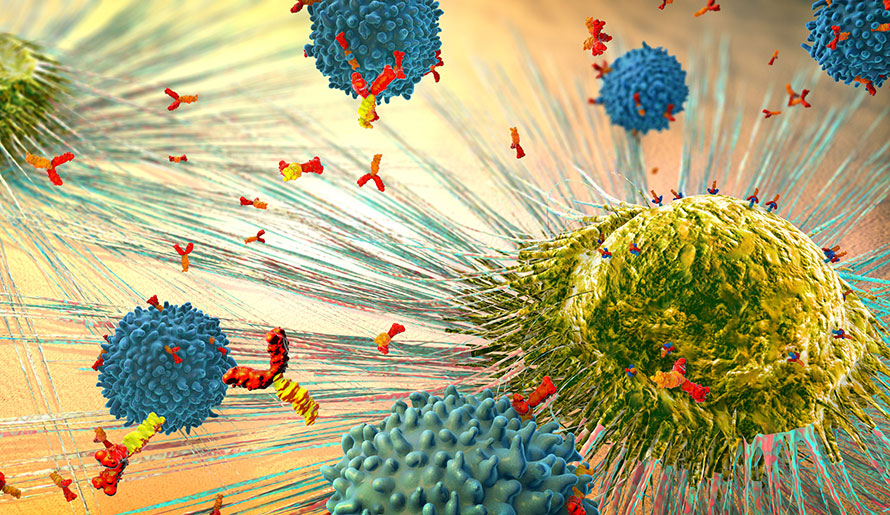
Tumor Infiltrating Lymphocyte Therapy for Solid Tumors
Moffitt Cancer Center has been at the forefront of cellular immunotherapy for over a decade. This therapy involves using immune cells as an alternative to drug compounds or molecules to fight cancer. One type, in particular, tumor-infiltrating lymphocyte therapy or TIL, has shown promise in solid tumor cancers. For TIL, surgeons remove a patient’s tumor and send it to a lab. The tumor is then minced to allow recovery of the tumor-infiltrating lymphocytes – T cells that have been able to penetrate the tumor. These cells, which can detect and invade the tumor, are then multiplied to billions in number in a process that can take several weeks. Once infused back into the patient, the army of T cells can seek and kill the cancer cells.
The potential impact TIL therapy can have on cancer patients is monumental, which is why Moffitt has been at the forefront of this research. In 2009, researchers from Moffitt visited the National Cancer Institute to learn the TIL protocol, and Moffitt became one of the first cancer centers outside of the institute to offer TIL to melanoma patients. Led by surgical oncologist Amod Sarnaik, MD, a phase 2 clinical trial for patients whose advanced melanoma had not responded to other treatments reported a 38% response rate to TIL. The data is currently under review and Sarnaik is optimistic the treatment will soon be FDA approved later in 2023.
"I am very blessed to be in a position to actually see the genesis of a treatment at our center, carrying it all the way to regulatory approval. It’s a rare thing and hard to imagine at the time, but patients we treated 12 years ago are still in durable remission from their, at the time, incurable metastatic melanoma."
The first-ever lung cancer TIL trial led by medical oncologist Ben Creelan, MD, has also seen success. Two of 16 advanced non-small cell lung cancer patients on the trial had a complete response after receiving the immunotherapy drug nivolumab prior to their TIL infusion.
Moffitt was also the first in the country to open a TIL trial in sarcoma for adolescent and young adult patients between ages 18 and 39 with metastatic sarcoma who have failed at least one other standard treatment therapy. While results are still pending, the team, led by surgical oncologist John Mullinax, MD, is also focusing on ways to optimize the treatment that patients receive in future trials.
Featured TIL Trials for Solid Tumors
Moffitt researchers have received more than $26 million in grants to study TIL therapy. They have launched 16 research projects focused on optimizing the cellular therapy, and opened eight TIL clinical trials across multiple disease sites, with more planned to open in the near future.
Melanoma:

Oncologist
Principal Investigator: Amod Sarnaik, MD
Summary: The purpose of this first in human study is to evaluate the feasibility, safety, and efficacy of administering TBio-4101 (tumor infiltrating lymphocytes [TIL]) after receiving a lymphodepleting chemotherapy regimen and before receiving interleukin-2 (IL-2) in participants with unresectable or metastatic melanoma.
Lung:

Trial Portfolio Director
Principal Investigator: Ben Creelan, MD
Summary: LN-145 is a ready-to-infuse, autologous TIL therapy that utilizes an autologous TIL manufacturing process, as originally developed by the NCI and further optimized by Iovance for the treatment of patients with metastatic NSCLC. The cell transfer therapy used in this study involves patients receiving an NMA lymphocyte depleting preparative regimen, followed by infusion of autologous TIL, then finally followed by the administration of IL-2.
Principal Investigator: Ben Creelan, MD
Summary: To determine the effect of a special preparation of cells, called tumor-infiltrating lymphocytes (TIL) stimulated with CD40L, when given with the drug nivolumab, for patients with EGFR, ALK, ROS1, or HER2-genomically altered lung cancer.
Principal Investigator: Ben Creelan, MD
Summary: LN-144 (Lifileucel)/LN-145/LN-145-S1 is an adoptive cell transfer therapy that utilizes an autologous TIL manufacturing process for the treatment of patients with advanced unresectable or metastatic melanoma, advanced squamous cell carcinoma of the head and neck, and non-small cell lung cancer. The adoptive cell transfer therapy used in this study involves patients receiving a nonmyeloablative (NMA) lymphodepletion regimen, followed by infusion of autologous TIL followed by the administration of a regimen of IL-2. Patients in Cohorts 1A, Cohort 2A, and Cohort 3A will receive TIL plus pembrolizumab. Patients in Cohorts 1B and Cohort 3B will receive TIL as a single therapy.
Cervical:

MS, FACOG, FACS
Principal Investigator: Robert Wenham, MD, MS, FACOG, FACS
Summary: The purpose of this study is to find out if an investigational product called LN-145 (a patient’s own immune cells called tumor infiltrating lymphocytes (TILs)) is safe, tolerable and effective in participants with recurrent and/or metastatic cervical cancer. The cells are extracted from a patient’s tumor, grown in a lab, and reinfused. LN-145 is an investigational drug and has not been approved by the Food and Drug Administration (FDA). Other drugs are used in this study, although they may be approved for other conditions may be considered investigational in this study.
Bladder:

Principal Investigator: Michael Poch, MD
Primary Objective: To evaluate the feasibility, safety, and tolerability of intravesical adoptive cell therapy (ACT) using TIL in patients with urothelial cell carcinoma (UCC), specifically high-grade BCG unresponsive non-muscle invasive bladder cancer (NMIBC) tumors.
At Moffitt we recognize the importance of clinical trials, and we use these studies to develop new and improved ways to prevent, screen for, diagnose and treat a wide array of malignancies. In fact, we’re home to the largest clinical cancer research unit in Florida, with more than 350 active clinical trials. Click the link below to view our entire trial portfolio.
If you'd like to refer a patient to Moffitt Cancer Center, complete our online form or contact a physician liaison for assistance. As part of our efforts to shorten referral times as much as possible, online referrals are typically responded to within 24 - 48 hours.
